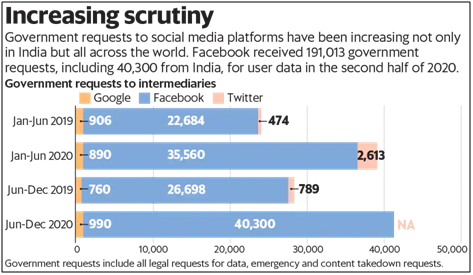

Context
Recently Twitter has decided to move to the Karnataka High Court challenging the Union government's orders to block some content posted on its website.
Background
- The issue began with the government issuing a “final notice” to Twitter asking it to either comply with its orders or face a slew of enforcement measures, including losing its “intermediary status” and criminal penalties for its personnel.
- Twitter lost its intermediary status as it does not comply with the new IT rules by July 4.
- The government has reportedly warned Twitter that it must comply with the latest IT Rules by July 4.
- Twitter has sought judicial review of some of the content that forms a part of various Blocking Orders on these grounds and requested relief from the Court to set aside these Blocking Orders.
|
What is intermediary protection?
What does losing the protection mean?
|
Analysis
What is the bone of contestation between the microblogging platform and the Central government?
- The disparity in the assessment of what constitutes ‘free expression’ and harm to public order among the two entities is the premise of the entire contestation.
- As all foreign intermediaries have the right to judicial review. Twitter filed a writ petition challenging several of the blocking orders:
- to set aside multiple blocking orders of the Central government
- to alter their directions to identify specific violative contentthan imposing a blanket ban on individual accounts
- Reason sighted by Twitter: According to Twitter, the blocking orders were “procedurally and substantially” non-compliant with Section 69A of the Information Technology Act (IT Act).
|
What is Section 69A of the IT Act?
Procedure:
Constitutional Safeguard:
|
What kind of content has fallen under the purview of Section 69A?
- The Supreme Court in its past judgements has suggested the content must be viewed from the standards of a “strong-minded, firm and courageous”
- The assessment must not be from the standpoint of a “weak” and “vacillating” individual who may sense danger in every hostile point of view.
What is the Twitter argument?
- The blocked content does not meet the “threshold” for restricting access.
- The vast majority of people who consume the content under scrutiny are necessarily literate and can reasonably perceive the full context of the content.
Procedural issues Twitter has highlighted:
- The government is only reproducing the words of Section 69A as reasons for blocking URLs and accounts and has not sighted clear reasons why the restrictions were necessary in the interest of public order or for any other reason.
- It is also important to understand that much of the content in these URLs deemed to be fit for takedowns is either journalistic or of a political nature, or even dissent. For example, some of the tweets were by farmers and others during their agitations against the farm laws.
- The government has not complied with rules under the Information Technology (IT) Act which call for a hearing of the author of the content besides the intermediary before any takedown action.
| The Supreme Court’s ruling in, Fatehgarh vs Ram Manohar Lohia (1960) held restrictions made in the public interest must possess a reasonable connection to the objective being achieved. They need to be set aside should the co-relation be “far-fetched, hypothetical or too remote”, in other words, bearing no proximity to public order. |

Users’ rights violation:
- The blocked content at issue does not have any apparent proximate relationship to the grounds under Section 69A.
- The government failed to demonstrate how the content is violative of Section 69A.
- It is a principally disproportionate measure and violates the rights of users under the Constitution, especially when the reason for blocking lacks specificity.
Taking down the whole user account should be a last resort:
- Ministry of Electronics and Information Technology (MeitY), has many times stated that if only some portion or some content is unlawful, then the platform may take proportionate action of removing such alleged information alone, and should not completely suspend the user account.
Conclusion
Internet and telecommunications system have come a long way since the times when the IT Act was framed in 2000. To keep up with the pace of development the Government came up with the Information Technology (Intermediary Guidelines and Digital Media Ethics Code) Rules, 2021, which, besides bringing about obligations for accountability from social media companies and platforms, went on to add onerous requirements such as traceability of online conversations and new oversight functions that are weighted in the Government’s favour.
No doubt that Twitter is under the unambiguous obligation to comply with Indian laws. But it also has the uncontested right to be heard in a court of law. Twitter filed a writ petition challenging several of the blocking orders. Twitter’s case in the Karnataka High Court could lead to greater scrutiny of the Rules and to a clear legislative debate on how to remake them in a way that they do not impinge on the right to freedom of expression and privacy in the online space.


